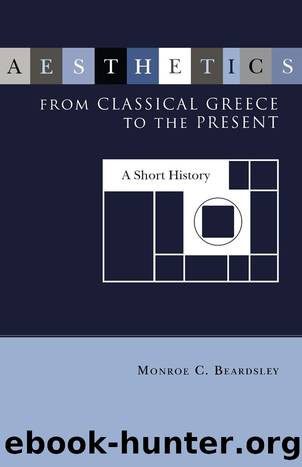Aesthetics From Classical Greece to the Present by Monroe C Beardsley

Author:Monroe C Beardsley [Beardsley, Monroe C]
Language: eng
Format: epub
ISBN: 9780817366230
Publisher: University of Alabama Press
To seek for a principle of taste which shall furnish, by means of definite concepts, a universal criterion of the beautiful, is fruitless trouble; because what is sought is impossible and self-contradictory [§ 17; p. 84; cf. §§ 33â34].
If aesthetic pleasure were merely empirical, the stimulation of an inner or outer sense, as the empiricists thought, this inquiry might be feasible, though the criterion found would only be probable, not necessary. Or if aesthetic pleasure were dependent upon a concept of some kind, as the rationalists thought, then such a criterion might be determined a priori, and applied by reason to mark out beautiful objects and demonstrate their beauty. However, aesthetic pleasure is neither sensuous nor intellectual, but something else (cf. § 58).
The fourth aspect of the judgment of taste is its modality: and that is necessity. âThe beautiful we think as having a necessary reference to satisfactionâ (§ 18; p. 91). This necessity is not apodictic, for no one who makes a judgment of taste can guarantee that all others will agree. Kant calls it âexemplaryââa particular judgment invites universal assent: it âclaims that every one ought to give his approval to the object in question and also describe it as beautifulâ (§ 19; p. 92). But it also promises agreement on the part of all those who correctly relate the object to their own cognitive faculties. The necessity, or obligatoriness, implicit in the judgment of taste presupposes a âcommon senseââthe state of mind âresulting from the free play of our cognitive powersâ (p. 93)âin all men. Do we have any reason for presupposing such a common sense? Yes, because it is a necessary condition of the shareability (âcommunicabilityâ) of knowledge itself, and this is assumed by all philosophical inquiry that is not skeptical (§ 21; cf. § 32). But this question really looks forward to the Deduction (see below).
The Second Book of the Analytic presents Kantâs âtranscendental expositionâ of the sublime. Beauty and sublimity have two things in common: they can both be predicates of aesthetic judgments that are singular in logical form and claim universal validity, and they afford in themselves a pleasure that does not depend on sense or on a definite concept of the understanding. But beauty and sublimity are contrasted in two respects: that the former is connected with the form, hence the boundedness, of an object, while the latter involves an experience of boundlessness; and that the former depends upon the purposiveness of an object, making it seem âas it were, pre-adapted to our judgmentâ (§ 23; p. 103), while the latter is aroused by objects that seem âas it were to do violence to the imagination.â The purposiveness we observe and call beautiful enriches our very concept of nature, by suggesting that it is not mere mechanism, but âsomething analogous to artâ (p. 104); but it is wildness, chaos, disorder and desolation that excite sublimity, and therefore âthe concept of the sublime is not nearly so important or rich in consequences as the concept of the beautiful.
Download
This site does not store any files on its server. We only index and link to content provided by other sites. Please contact the content providers to delete copyright contents if any and email us, we'll remove relevant links or contents immediately.
The European Opportunity by Felipe Fernández-Armesto(569)
The European History Highway: A Guide to Internet Resources by Dennis A. Trinkle Scott A. Merriman(535)
Morgan Kaufmann Digital Watermarking and Steganography by Ingemar Cox Matthew Miller Jeffrey Bloom Jessica Fridrich Ton(528)
The Seven Wonders of the Ancient World by Michael Denis Higgins(521)
Hyperculture by Byung-Chul Han(509)
European Security in a Global Context by Thierry Tardy(505)
European Security without the Soviet Union by Stuart Croft Phil Williams(504)
The Routledge companion to Christian ethics by D. Stephen Long Rebekah L. Miles(498)
Get Real with Storytime by Julie Dietzel-Glair & Marianne Crandall Follis(443)
Hudud Al-'Alam 'The Regions of the World' - a Persian Geography 372 A.H. (982 AD) by V. V. Minorsky & C. E. Bosworth(436)
Gorbachev And His Generals by William C. Green(428)
Tibetan Studies in Comparative Perspective by Chih-yu Shih Yu-Wen Chen(427)
Governance, Growth and Global Leadership by Espen Moe(418)
How Languages Are Learned 5th Edition by Patsy M Lightbown;Nina Spada; & Nina Spada(406)
CliffsNotes on Fitzgerald's The Great Gatsby by Kate Maurer(400)
The Oxford History of the World by Fernández-Armesto Felipe;(388)
The Egyptian Economy, 1952-2000 by Khalid Ikram(379)
Oral Poetry and Narratives from Central Arabia: The Poetry of Ad-Dindan : A Bedouin Bard in Southern Najd (Studies in Arabic Literature, Vol 17) (English and Arabic Edition) by P. M. Kupershoek P. Marcel Kurpershoek(365)
The Oxford Handbook of the Incas by Sonia Alconini(364)
